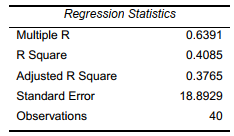SCENARIO 14-17
Given below are results from the regression analysis where the dependent variable is the number of weeks a worker is unemployed due to a layoff (Unemploy) and the independent variables are the age of the worker (Age) and a dummy variable for management position (Manager: 1 = yes,0 = no) .
The results of the regression analysis are given below:

-Referring to Scenario 14-17,which of the following is a correct statement?
Definitions:
Conduct Disorder
A mental health disorder characterized by a repetitive and persistent pattern of behavior in which the basic rights of others or societal norms are violated.
Coping Power Program
An intervention program designed to help children and adolescents manage aggressive behaviors and improve problem-solving skills.
Problem-Solving Skills Training
A therapeutic technique aimed at enhancing an individual's ability to effectively address and solve personal and interpersonal problems.
Personality Characteristics
Enduring patterns of thoughts, feelings, and behaviors that distinguish individuals from one another.
Q8: Referring to Scenario 17-7,at the two cluster
Q23: Referring to Scenario 15-6,what is the value
Q51: The strength of the linear relationship between
Q87: Referring to Scenario 16-13,if a five-month moving
Q115: Referring to Scenario 12-11,the same decision would
Q124: Referring to Scenario 12-11,the null hypothesis claims
Q135: Only when all three of the hat
Q171: Referring to Scenario 14-17,the null hypothesis<br>H<sub>0</sub>:
Q211: Referring to Scenario 14-6,the estimated value
Q306: A physician and president of a Tampa